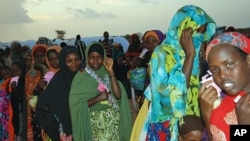The U.S. government is defending itself against new accusations that it has politicized aid to victims of Somalia’s ongoing famine, as well as failed to help the long-term situation in the conflict-wracked country. U.S. officials blame the al-Qaeda linked al-Shabab group for restricting outside aid.
While the United States has been one of the world’s leading donors in trying to help ease the effects of the devastating drought in the Horn of Africa, critics are saying it has failed victims in Somalia.
Such criticism was made frequently at a forum in Washington called “Famine in the Horn: Assessing the U.S. Response.”
Bronwyn Burton is with the Atlantic Council. “There are still 750,000 people who still really need help urgently in Somalia or they are going to die and most of them are women and children, tiny babies who absolutely no role in the conflict that we are witnessing in Somalia," said Burton. "The thing I would like to point out here is that while we have important interests that are not humanitarian interests in the country, we in the United States have done a very poor job of managing those interests and balancing them against the humanitarian needs of the Somali people.”
Burton pointed out that the United States gave more money to Somalia in humanitarian assistance in 2008 when there was no famine, than in 2011 when there is a famine, but when al-Shabab controls lots of territory.
She called on the U.S. Africa military command, Africom, to play a role in helping deliver food in areas with security challenges.
Other criticism came from John Norris, from the Center for American Progress. Norris said if the United States is really serious about helping people in Somalia, it should be serious about diplomatic efforts and figuring out a long-term solution. He said lots of money has been spent on humanitarian endeavors in perpetually unstable Somalia since the early 1990s, to little effect.
“How do we get off this hamster wheel of perpetual crisis and why are we in a position 20 years after Somalia was dominating headlines to find ourselves in a situation that is every bit if not more dire," said Norris. "I think that is because we have had a very hard time thinking down the chess board. We have been very willing as a country to spend hundreds of thousands of dollars, millions of dollars, billions of dollars in responding to Somalia but if you look at the amount of high-level diplomacy that has been directed toward it, it is a relative pittance.”
A representative for the U.S. government Nancy Lindborg, from the U.S. Agency for International Development, vigorously defended U.S. aid efforts, and said the problem was access to al-Shabab areas, not resources.
She said famine was being averted in other parts of Somalia, as well as Kenya and Ethiopia, because of cooperative authorities there and the success of development projects.
The U.S official wanted to focus on some of the positives, and said this crisis showed more and more countries and diverse organizations were now helping in such situations.
“More and more countries step up to this role of being humanitarian responders," said Lindborg. "We have the opportunity to help that feel more inclusive and cooperative. And so as you see, more Islamic groups and a huge Turkish response in Somalia, there is an opportunity to deepen our ways to cooperate together and use the imperative that they can bring to offer access.”
Panelists did agree ineffective security at refugee camps for civilians, and especially women, fleeing drought conditions, was a major concern. They also said the current Kenyan military operations into Somalia could worsen the immediate plight of drought victims in al-Shabab controlled areas.
Kenya sent troops into Somalia earlier this month following a series of cross-border kidnappings blamed on al-Shabab.
The radical Islamic group has waged a four-year campaign against Somalia’s United Nations and U.S.-backed government, which is widely viewed as corrupt and ineffective. Al-Shabab controls most of central and southern Somalia, including the only areas declared by the United Nations to be experiencing famine in the drought-ravaged Horn of Africa.




